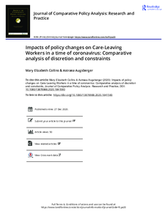Displaying 401 - 410 of 2221
"Experts and state agencies say families are reluctant to take in foster children for fear of spreading Covid-19," says this article from NBC News.
This study analyzed three open-ended responses from a national online survey examining compassion fatigue in Children’s Advocacy Centers (CACs) to understand the impact of work-related stress on child welfare workers (CWWs).
This policy analysis examines the impact of COVID-19 policy guidance on the role of workers who provide outreach to transition-age care leavers.
This study investigates the extent and causes of child abandonment and various practices and services in relation to prevention of child abandonment in Denmark and other high-income countries.
This article describes the benefits of monthly family team meetings for parents involved with child welfare. Findings are shared from semi‐structured, qualitative interviews conducted with 17 parents whose children had been placed in substitute care.
"Outside of the traditional foster care system exists a shadow system of potentially hundreds of thousands of children removed by CPS to their relatives or family friends—without a court case, monetary support, or due process," says this article from the Appeal which explores the phenomenon of "shadow foster care" in the U.S.
This article from USA Today shares the stories of international adoptees in the United States who grew up believing they were U.S. citizens, only to find that international adoption does not guarantee citizenship.
This webinar sheds light on the often under-the-radar work and impact of more than 3,000 Family Resource Centers in the U.S.
The U.S. Global Child Thrive Act - which reauthorizes programs to provide assistance to orphans and other vulnerable children in developing countries for FY 2020 through FY 2025 - has been passed by both houses of the U.S. Congress on 8 December 2020, as part of the National Defense Authorization Act (NDAA), and now awaits presidential signature to be signed into law, according to this article from the Ripon Advance.
This secondary analysis involved exclusively parents with children placed in kinship care by a child welfare agency. It examined associations between parents’ receipt of needed services and 6 sets of variables measuring parents’ needs, access to service providers, social structural factors, demographic factors, family resources, and child welfare interventions experienced.

